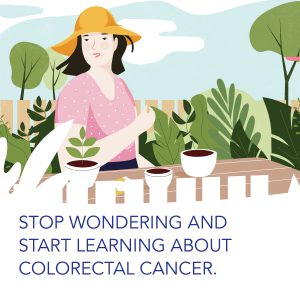Five Things to Know about Colorectal Cancer Screening
Posted on byDivision of Cancer Prevention and Control 
Colorectal cancer is the #2 cancer killer of both men and women in the US. Here are five things to know about colorectal cancer screening.
- Colorectal screening is a process and may look different for everyone. Talk to your doctor about a screening schedule based on your risk and initial screening results.
- Colorectal cancer is often preventable. Colorectal cancer almost always develops from precancerous polyps, or abnormal growths, in the colon or rectum. These abnormal growths can be removed without surgery.
- Regular screening for colorectal cancer is recommended starting at age 50. You may need to be screened earlier if you or a close relative have had colorectal polyps or colorectal cancer, if you have an inflammatory bowel disease, such as Crohn’s disease or ulcerative colitis, or if you have a genetic syndrome, such as familial adenomatous polyposis or hereditary non-polyposis colorectal cancer (Lynch syndrome).
- You should still be screened even if you don’t have symptoms or a family history of colorectal cancer. Colorectal cancer often doesn’t cause symptoms early on, and while a family history can put you at a higher risk, most cancers happen in people without a family history.
- Several test options are available. There are six different screening tests, some that can be done either at home or in a clinic, that can prevent or detect cancer early.
More Information
Vital Signs: Screening for Colorectal Cancer
Questions to Ask Your Doctor about Colorectal Cancer
Colorectal Cancer Blogs
2 comments on “Five Things to Know about Colorectal Cancer Screening”
Comments listed below are posted by individuals not associated with CDC, unless otherwise stated. These comments do not represent the official views of CDC, and CDC does not guarantee that any information posted by individuals on this site is correct, and disclaims any liability for any loss or damage resulting from reliance on any such information. Read more about our comment policy ».


I hope the virtual colonoscopy becomes more widely available. It’s good to see all this information available.
I were diagnosed 11/28/2023. I’m so overwhelmed but I do have strong family friends support.